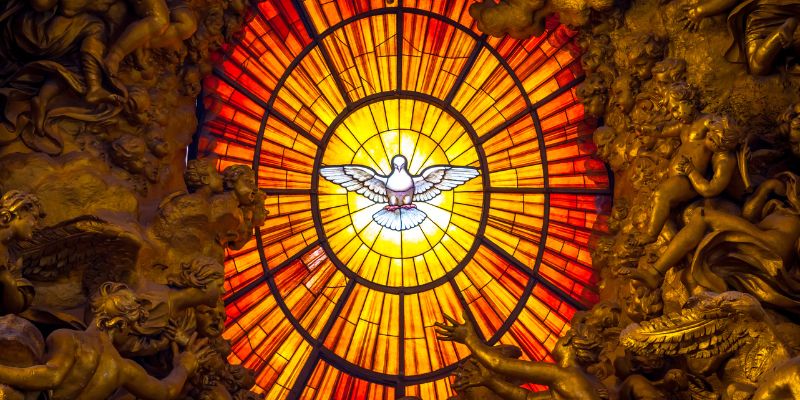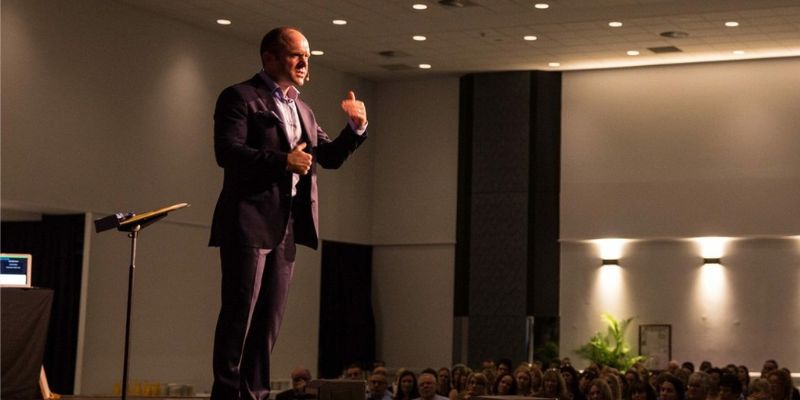In today’s episode, we delve into the vital essence of the missionary impulse within Christianity and Catholic education. Discover why this impulse is not just a historical artifact but a necessary force for spiritual vitality and growth. Join us as we explore how losing this missionary spirit can lead to stagnation and decline, and how embracing it can infuse every aspect of our lives with purpose and meaning.
Welcome Aboard
Hey there, my friend, Jonathan Doyle, with you once again. Welcome aboard to the Catholic Teacher Daily Podcast. Today, we are going to remind ourselves of a crucial and fundamental impulse in the life of every Christian. And in the lives of every Christian organization and Catholic school.
Rediscovering the Missionary Impulse

It’s something that I spoke about a few weeks ago because a friend gave me a book by the Protestant evangelist John Piper. It was a great book, it’s called Don’t Waste Your Life. Got a lot out of it, but I got to the closing section, and he wrote this extensive piece about missionary work. It was something that as a Catholic, I hadn’t thought a lot about.
I know that the church, of course, has an incredible missionary history. You go back to the acts of the apostles. You have the missionary journeys, the nature of faith is something we’re familiar with. But often, in our modern industrialized technological world, we can fall into the trap of thinking that something that belongs to someone else is probably the default. Someone else’s doing it somewhere. Maybe it’s evangelical churches doing it, or it’s something perhaps it belongs to a bygone era.
Nothing my friend could be further than the truth. What I want to try to sell you today is this idea that if Christians, Catholics, and Catholic schools are not connected to this missionary impulse, then the trajectory seems to be, by all accounts, death. It doesn’t end. It just seems to be this fundamental principle of reality.
Understanding the Missionary Impulse

For years, I’ve talked about the second law of thermodynamics. If you’re familiar with that, you’ll know that in the study of thermodynamics in physics, we’re dealing with something called entropy, which is that any object lifts itself with no other impulses acting upon it, will move from a hotter state to a colder state.
So energy tends to wind down, systems wind down. Entropy collapse is the state of things, unless there is a new influence or a new impulse that allows them to continue in the state they’re in or to intensify this state. That’s some basics on thermodynamics, or you Catholic science teachers out there. I hope I haven’t messed up. You’re not choking on your coffee, but that’s pretty close.
I want to share this quote with you today. It speaks in some ways for itself, but then I’m going to just unwrap it with you a little bit. It’s from. A.B. Simpson listened to this. It says,
“The Christian that is bound by his own horizon, the church that lives simply for itself, is bound to die a spiritual death and sink into stagnancy and corruption. We never can thank God enough for giving us not only a whole Gospel to believe, but a whole world to give it to.”
A.B. Simpson Tweet
The Macro Perspective: Missionary Mandate

All right. So let’s go to the macro level first, the purpose of this podcast is to remind you that if you, as a Christian or a Catholic, if your Catholic school is not missionary to some degree, then according to people like A.B. Simpson, the outcome is spiritual death, stagnancy, and corruption. I think he’s right.
If you go back to, right at the moment where we are when I’m recording this is in the seventh week of Easter. The readings for daily mass come predominantly from the acts of the apostles and also from the farewell discourses in John’s gospel. You look at the acts of the apostles, and of course they’re, we’re coming into Pentecost at the time of recording. Once the spirit arrives at Pentecost. What is the impulse? What is the outcome? Do the apostles and all the other early Christians have the impulse to circle the wagons and close in upon themselves? Is there impulse to withdraw into silence, write firsthand accounts, and keep them all to themselves in little journals. Of course it’s not. The impulse is explosive. The impulses are absolutely world-changing; it is an epoch changing. And the fundamental movement is outward. It’s towards others.
A Model for Catholic Schools: Tracking Christianity's Impact
Then, the other day, I was reading about some of Paul’s missionary journeys. When he gets to Corinth and he’s in the area, The impulse is always to move, to communicate, to share, to convince—it’s just this missionary impulse to share the Kerygma, the good news, and the essence of the gospel, that Christ is the anointed one of God and he has died, he has risen, and they are witnesses to the resurrection. Then they are going to share that message with everyone.
I always recommend it to people. If you get a chance to read Tom Holland‘s book, Dominion, which is a big read, it tracks the incredible impact of Christianity, basically from Pentecost. So the growth of the church, the health of the church, the health of the Christian is fundamentally linked to that missionary impulse.
Challenges Facing Catholic Schools

So for a Catholic school, in my country, it’s particularly possible for schools to collapse into functionalism. For decades, I’ve been arguing that the risk for principals is that they make a kind of bargain with God. We need to keep enrollments up, and we need to keep parents pleased with what we’re doing. So we focus very much on academics and friends. It is an important thing, it is a necessary thing, it is a good thing in and of itself. But there is a much greater reason that the Catholic school exists.
The Role of Catholic Schools

The reason that the Catholic school exists is Matthew 28. Because Jesus tells the disciples to go and make disciples of all nations. He tells the apostles to go out, to share the good news, to make disciples, to baptize them in the name of the father, the son, and the spirit, and to teach them everything that Jesus had commanded them. To make disciples, the church doesn’t exist for any other reason; the church does not exist for any other reason.
If you’ve seen me live, I always talk about it with Paul VI, Evangelii nuntiandi. He says the Catholic church does not have a mission, she is a mission. The church exists only for the purpose of evangelization. That is the only reason the church exists: to make disciples.
So if the Catholic school loses its missionary impulse, Then it’s just a matter of time for death, stagnancy, and corruption. Sorry, there is no other path here. We are either growing through the missionary energy that the spirit gives us or by collapsing in on ourselves. I don’t think I’m wrong.
Personal Reflection and Application: Navigating Faith and Social Media
I’ve been really feeling this in all dimensions of my life lately. I like Instagram, I don’t like Instagram, I like the fact that I can reach people and share encouraging things on Instagram. One of the tensions that I’ve had for a long time is that I have a bunch of fantastic friends who are not people of faith. And I’ve had this tension about whether I share faith by stuff because there are a lot of people that follow me, of course, Catholics, and teachers. I’ve been carrying this in mind for a long time, but recently, by the grace of God, I’ve gone, you know what, if my non-Christian friends don’t like me because I want to preach the gospel and encourage people in faith, then I’m going to lose them. And that’s a terrible pity.
If they unlike me, because I’m faithful, maybe they weren’t great friends anyway. I don’t know, but I’ve started to just go whatever. I’m going to preach, I’m going to post things and share things that encourage faith. Because in that tiny little corner of the internet, I have a chance to be a missionary. I have a chance to share the news of faith with people who may not know it and I’m not going to stop. And I think this next chapter of my life is going to be more and more focused on trying to serve the purposes of God and define a deeper sense of meaning and identity in every single day of my life through that missionary impulse. It gives my life a sense of purpose, reason, and meaning.
The Vitality of Mission in the Church

So, my friend, I want to encourage you, as a Catholic teacher and as a Catholic leader, to realize that if we collapse in on ourselves, as Simpson says, we’re bound by our own horizons or have a church that lives simply for itself.
You know where I live here, I want to do this very carefully, so it doesn’t sound triumphalistic, but where I live there’s a uniting church nearby. And if you’re not familiar with the uniting Church in Australia, and I don’t mean to really offend anybody. But the Anglican church, the uniting church, split off from the Anglican church here in Australia, and it became an Australian version of the Anglican church, and it’s been in a death spiral for a very long time. It’s pretty much literally limping into this kind of non-existence. Again, say this with no triumphalism, but one of the things that’s happened is that it’s hitched its wagon completely to the star of modernity, in the sense that it thinks of every possible major political issue in our day. It’s linked to the gospel. It’s completely gospel to those things, progressive issues mostly. And you drive past there, and there’s all these banners and about progressive political issues. And I’m like, I know that church is dying. I know it is; I’m not judging anybody, I’m not trying to be so arrogant triumphalistic Catholic. I’m really not, I’m just observing an objective reality.
Because once the church loses the missionary impulse to make disciples of Christ, then all it has left is to become a kind of Christian patina or a Christian veneer over political objectives. It just doesn’t work, if people want politics, they can go and get politics and to be honest, politics is everywhere. It’s in everything, it’s in sports; it’s in music; it’s in podcasts; it’s in everything.
Safeguarding the Mission: A Plea for Spiritual Fervor

I think what people may be looking for is probably beauty and truth, peace and transcendence, purpose and meaning, and sacrifice and self-transcendence and those things were found in the church and the Catholic church. But we’ve got to keep hold of that missionary impulse. If we lose that, then what else do we do? We start to get ourselves caught up in all the political issues of the day. I don’t care about the political issues per se. I care about Christ and knowing him.
If I have the spirit of, if I beg the Holy Spirit to be more present in my life, then I am going to be inspired to act in particular ways that will bring about the purposes of God in some tiny way for the world in which we live. I’ll leave that up to God, the promptings of the spirit, the magisterium, the doctors of the church, and the great men and women who’ve come before me in the faith.
Missionary Zeal and Church Renewal
All right. I don’t want to lose you, but I’m just saying. If we’re not missionary, we’re going to be irrelevant. Kids are going to look at us in our schools and go, you are just repeating the same political stuff that we’re hearing everywhere else. Maybe we just gave them Christ. We preached the gospel again. If we asked and begged the Holy Spirit to give us the missionary zeal to go into our classrooms, not to indoctrinate, but to be examples of the life of Christ and to give them opportunities for prayer and to hear the gospel, to teach them, to catechize them. The only way we’re going to do that is if we genuinely believe that the relationship with Jesus Christ and his church is good for the person. Not just good for the person, but great for the person.
The Imperative of Authentic Witness

So my friend, as A.B. Simpson says, let’s thank God that he hasn’t just given us a whole gospel to believe in, but a whole world to give it to; we’re not going to run out of people to give it to. God has placed you in a little corner of the world to give the gospel to the people in that corner of the world and we’ve got to be faithful to that. God’s given me this particular microphone today in this particular studio to send a missionary message to anybody who’s still listening. And my job is to be faithful to that, and to be a missionary in this particular place that he’s called me to be. He’s asking you to do the same.
Closing Thoughts and Engagement
God bless you, my friend, if you’ve liked today’s message. Please make sure you’ve subscribed. Share this with people. Everything’s on the website: jonathandoyle.co. If you want to book me to do consulting work, they are all on the website. Instagram, you can find me at @jdoylespeaks. You can find me there; come and say hello.
God bless you my friend, this has been the Catholic Teacher Daily Podcast, and you and I are going to talk again tomorrow.




